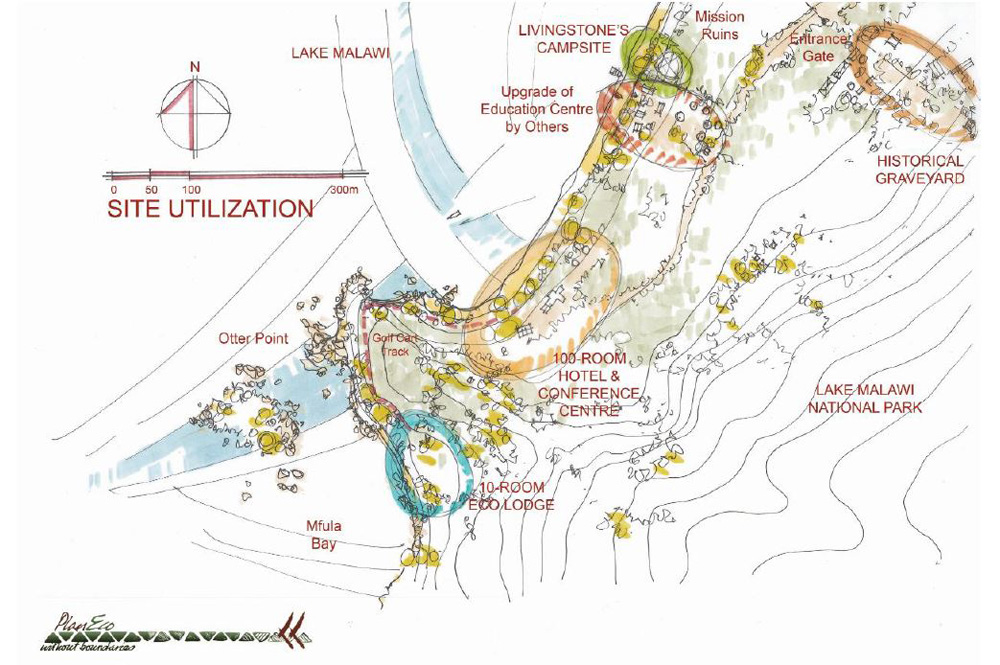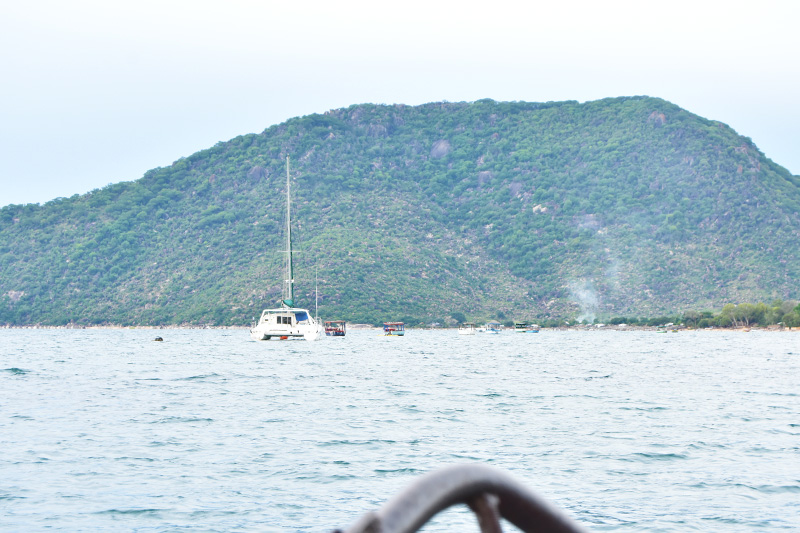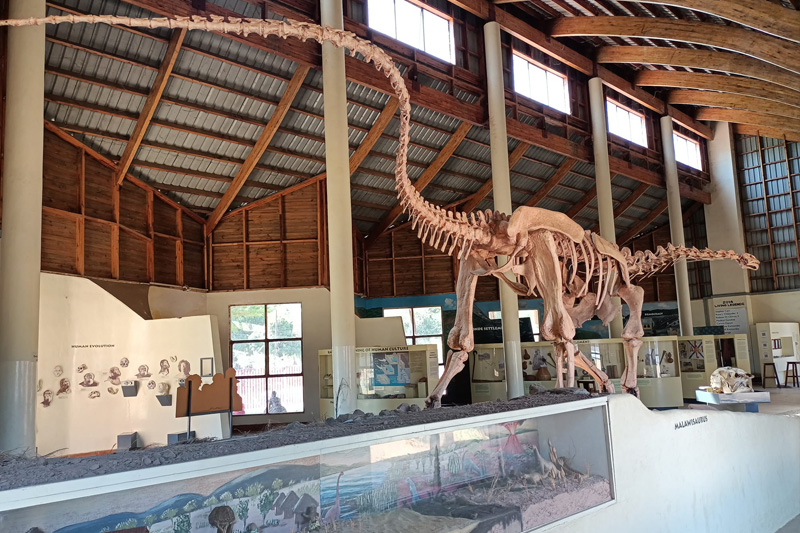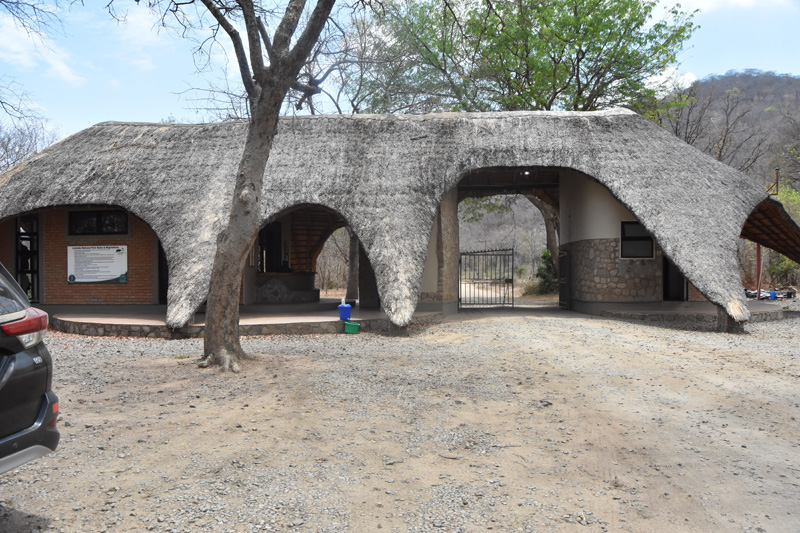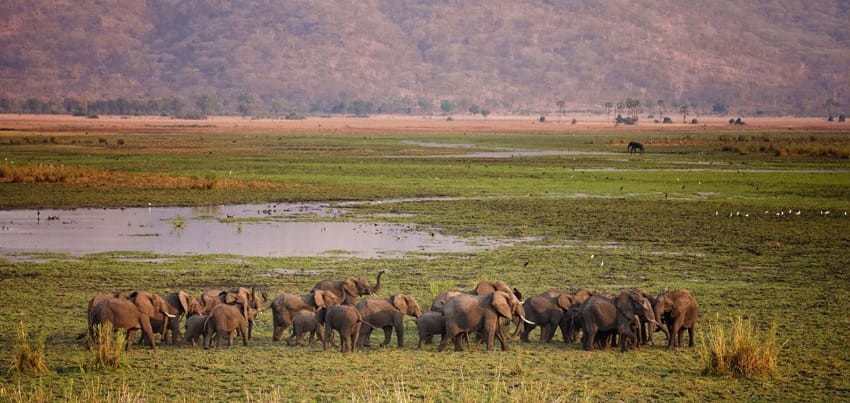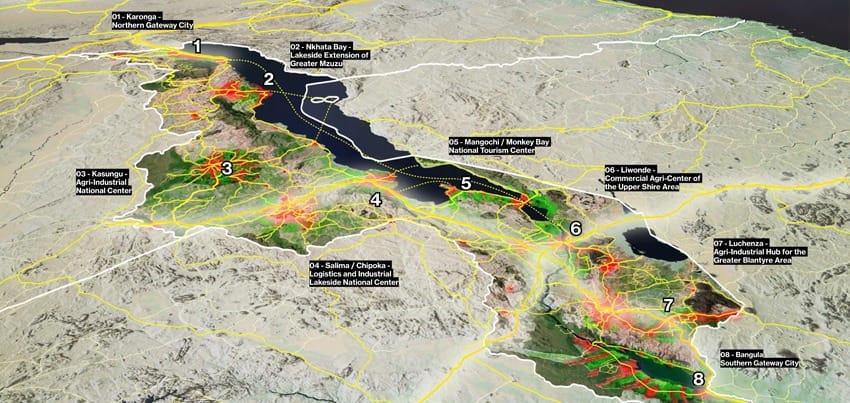The Ministry of Tourism, with support from the Africa Development Bank, has developed a 20-year Malawi Tourism Development Master Plan. The tourism master plan identifies 103 tourism and infrastructure projects, the implementation of which will lead to the promotion and growth of the tourism sector in Malawi. This will in turn result in economic growth and job creation.
On 4th April 2022, President Lazarus Chakwera launched the Malawi Tourism Development Master Plan. In the plan, 10 projects are flagged as priority tourism investment projects. Below we unpack the ten priority projects and summarise the 103 projects that are spread across Malawi.
*A breakdown of the projects in the recently launched Malawi Secondary Cities Plan here.
*The full 340-page master plan is available for download here.
Priority Project 1: Transit Facility at Songwe Border Post in Karonga
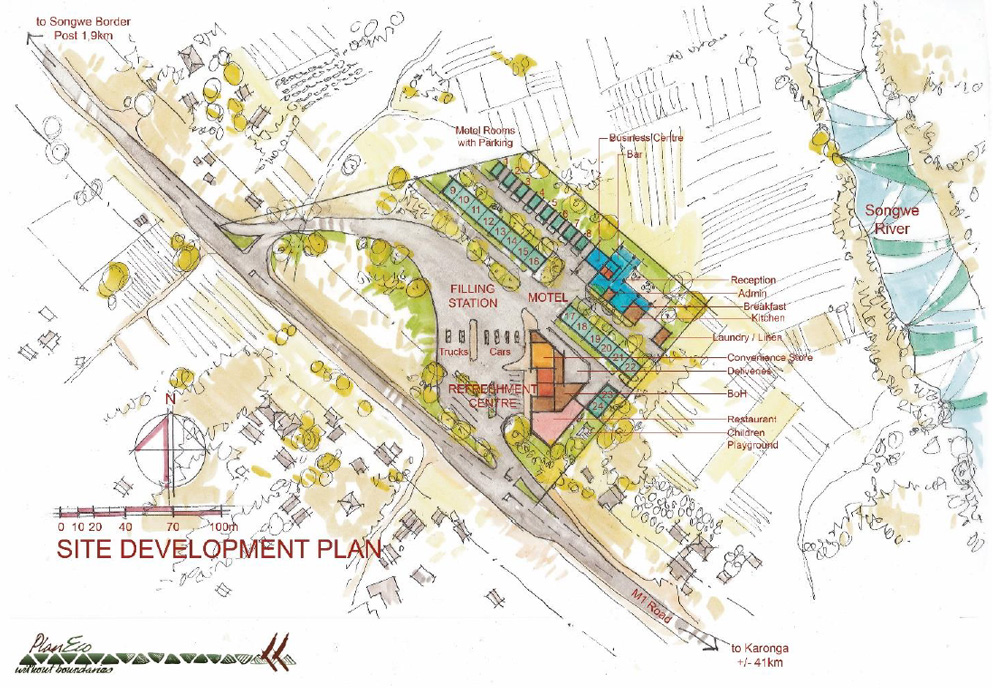
At a glance
The proposed Transit Facility will have:
- A Service Station
- 40-seat restaurant with outside shaded seating and a children’s playground
- Public toilets, ATM facilities and a fast-food outlet
- 24-room Motel
The details
The project is situated along the M1 road, close to the Songwe border post. The objective is to develop a one-stop-shop facility with a motel so as to ease those in transit. A number of people use the border when travelling to and from Tanzania for business purposes, therefore a need for accommodation and other support facilities such as a one-stop shop is very critical.
The Transit facility will comprise a 40-seat restaurant with outside shaded seating and a children’s playground. Public toilets, ATM facilities and a fast-food outlet will be part of the facility. The concept also proposes a fueling station on-site to ensure the reliable availability of fuel to travellers.
Currently, travellers between the two countries prefer to spend an overnight on the Tanzania side and cross the next morning. The proposed motel will have 24 rooms with supporting facilities.
Tourist attractions in the area
As a tourist destination, Karonga has archaeological and historical attractions such as the Karonga Museum and nature attractions such as Misuku Hills (where there are two bigger forests, Mughese and Wilindi. The Nyika National Park is a key wildlife tourism destination in the country.
Priority Project 2: Livingstonia Mid-market Resort in Nyika National Park in Rumphi
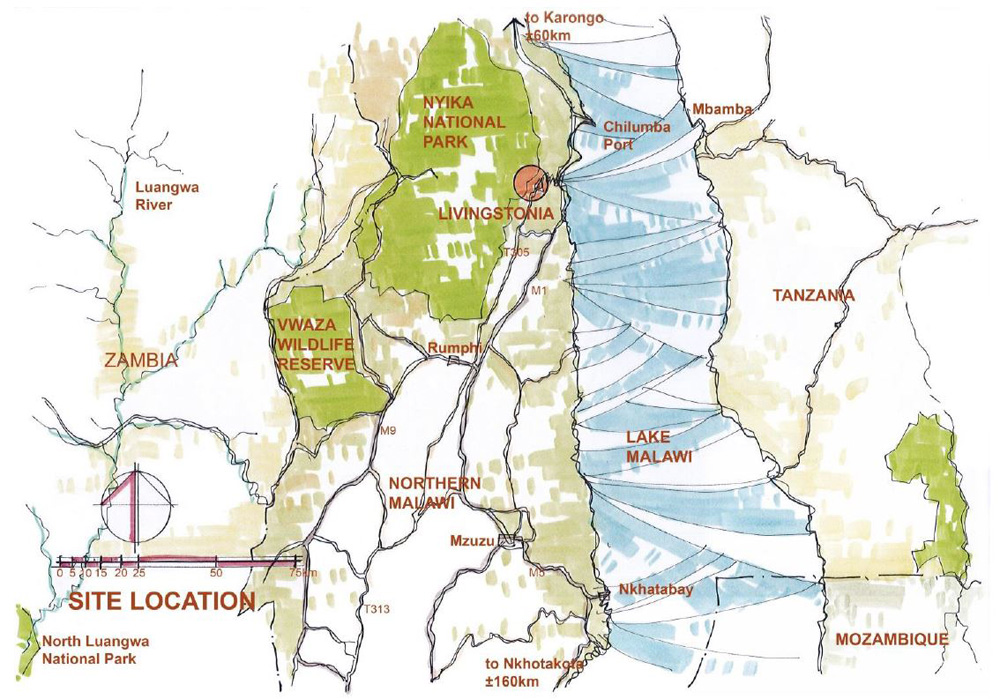
At a glance
The project is situated on the higher rounds between Lake Malawi and the Nyika Plateau. A family-orientated Resort, with diverse dining experiences and activities for young and old, is proposed. It will include the following:
- 20 room hotel with dining for residents, a bar and a lounge
- Resort activity centre offers an indoor multi-purpose hall, gym, retail, business centre, pizzeria and refreshment centre, two squash- and tennis courts, and a putt-putt court
- Self-catering chalets which will provide both 2-bed and family units
The details
The main objective is to build a 20-room Hotel, self-catering accommodation and leisure facilities that will provide an alternative mid-to high-level tourist product in Livingstonia enhancing tourists’ experience.
The requirement exists for a mid-to-upmarket overnight facility, provided in a 20-room hotel, plus self-catering chalets. An Activity Centre will offer guests and day visitors indoor- and outdoor activities, such as tennis, putt-putt, swimming, and entertainment. Indoor activities can include a children’s playground, squash courts, a gym, and a multi-purpose hall to accommodate indoor sports. A well-equipped Business Centre will allow clients to keep in contact with their businesses while enjoying un-spoilt nature.
A family-orientated Resort, with diverse dining experiences and activities for young and old, is proposed. Due to its high location on the plateau, Livingstonia offers a mild climate, and stunning views and is free of mosquitoes. The location also has many interesting historical buildings that can be visited on foot and hiking trails into surrounding areas.
A 20-room hotel with dining for residents, a bar and a lounge overlooking Lake Malawi is planned, with the possibility of adding rooms in future. Nearby, a resort Activity Centre offers an indoor multi-purpose hall, gym, retail, and business centre. A pizzeria and refreshment stand overlooks the swimming pools and courtyard, connecting all the facilities. Two squash- and tennis courts, together with a putt-putt course, will be open to day visitors as well. Self-catering chalets (also with expansion opportunities) will provide both 2-bed and family units.
Tourist attractions in the area
Livingstonia is a historic and cultural centre, the hub of the Scottish missionaries who settled in Malawi in the 1870s. The leading missionary Dr Robert Laws established the best school in the region and wanted the town to develop into a university. Several structures of the Livingstonia mission still survive today, including many of its distinctive red-brick buildings, a church, and a small museum. On display, there are fascinating exhibits, including photographic glass slides, old photographic prints, wall displays, furniture, and equipment dating from the earliest times of the establishment of the mission.
Priority Project 3: Activity Centre on Likoma Island
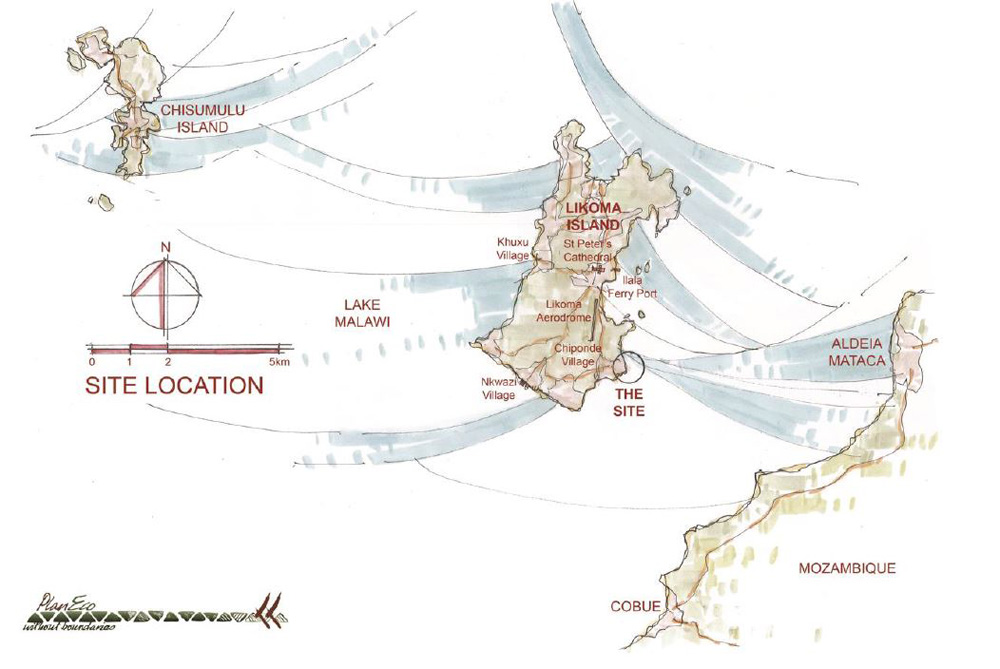
At a glance
The project site is on the southern side of the Island, close to Kaya Mawa. The Activity Centre to have all water- and land-based activities available in one place. It will include the following:
- A 30m long jetty
- 6 shops
- A 60-seat restaurant
- A small fast-food outlet
- An aquarium
The details
The main objective is to enhance tourism offerings in Likoma district and cater to the broad tourism market – both domestic and international visitors. The Specific objectives for the Activity Centre at Likoma include:
- Enhance tourists’ experiences.
- Increase the visitor numbers to the destination
- Establish an aquarium where visitors would be enlightened about the marine life around the Island.
- Maximize the commercial shopping potential on the Island
Likoma Island is currently underdeveloped from a tourism point of view. Although there are a few places to stay (and more on the way), there is very little to do, apart from swimming in the lake, snorkelling, and visiting Likoma town. An Activity Centre intends to have all water- and land-based activities available in one place and provide a central point where local guides and artisans can offer their services or goods.
A 75m long jetty, 3m wide, needs to be constructed. On the shore, 6 shops each 20m² will allow operators to rent out equipment, with male and female toilets and change rooms close by. A 60-seat restaurant will sell fresh fish and other local dishes, while a small fast-food outlet will cater to those on their way somewhere. An aquarium will enlighten visitors about the marine life around the Island. Stalls, where local craftsmen can sell their wares, will be provided at the entrance to the centre.
Tourist attractions in the area
The islands of Likoma and Chizumulu lie in the eastern waters of Lake Malawi and South-East of Nkhata Bay. Likoma is the larger of two inhabited islands. It is surrounded by crystal-clear waters, sandy beaches, and an abundance of cichlids, some of which are endemic to the island area. Likoma was used in the early 1900 to fight against the slave trade. The Island is also renowned for Central Africa’s third-largest cathedral, St. Peters built in the 1870s. The Island is 20 sq. km.
Priority Project 4: Integrated Waterfront Development in Nkhata Bay
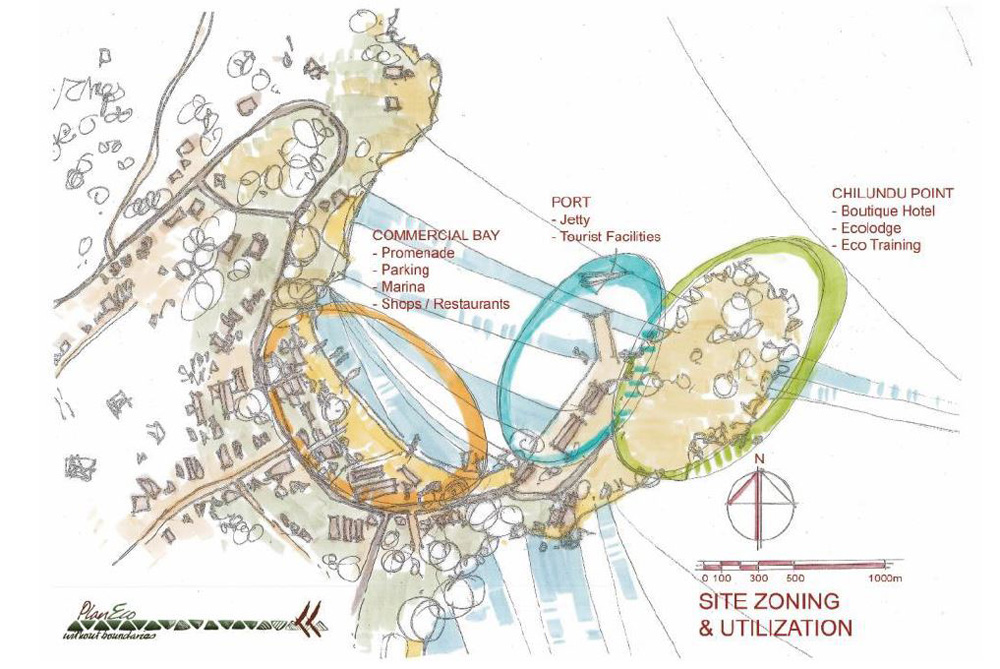
At a glance
The project is in Nkhatabay which lies on the shores of Lake Malawi. It is also the closest connection to Likoma Island. The Integrated Waterfront Development will consist of three nodes the port and jetty, the commercial bay, and Chilundu Point. It will include the following:
- Upgradation of the port and jetty that will also include tourist facilities such as curio shops, public toilets, and a 40-seater cafeteria
- Commercial Bay will consist of a promenade, marina, and parking area
- Chilundu Point will include a 20-room boutique hotel, a 10-bed Ecolodge, and an Ecotourism training facility
The details
The main objective is to enhance Nkhata Bay’s tourism offering and cater to the broad tourism market – both domestic and international visitors. The Specific objectives for the Integrated Waterfront Development at Nkhata Bay include:
- Enhance tourists’ experiences.
- Increase the visitor numbers to the destination
- Establish an Ecotourism Training Facility and -lodge at Chilundu Point.
- Maximize the commercial shipping potential
Nkhata Bay is a unique lakeshore district because of its topography overlooking the bay and the peninsula called Chilundu Point. It has an ambience not experienced elsewhere and offers great tourism development potential, supported by solid commercial activities with an excellent location.
It is envisaged that it can become a waterfront destination of world-class standards, like the Victoria and Alfred Waterfront in Cape Town, South Africa. However, it will be a tourist drawcard, especially for international arrivals travelling to Likoma Island, Nyika National Park, and other Southern African destinations such as Luangwa in Zambia and Cabo Delgado province in Mozambique. The development will be done in phases by a consortium of stakeholders in a Special Purpose Vehicle (SPV).
The Waterfront Development will consist of three areas: the Port and Jetty, the commercial Bay, and Chilundu Point.
The Integrated Development concept will focus on three areas for development namely:
- The existing port facilities and jetty: The jetty needs to be enlarged similarly to the one at Chilumba Port in Karonga. The existing buildings are under-utilized, and better cargo handling equipment and storage are required. Tourists and others going onto the ferries have no facilities in the Port itself except a roofed waiting area. A proper waiting area, public toilets, cafeteria, and small convenience store are required.
- The Bay and its commercial activities: The local fishing industry uses the Bay to launch and berth their boats and sell their wares. It all adds to the charm and vibrancy of shops and eateries catering to everyone’s needs.
- Chilundu point: In the old days, the peninsula was used for storing oil brought from Dar es Salaam. The oil was pumped up the hill and later transported by smaller boats to other destinations. This activity stopped and there is only evidence of remaining concrete structures. Most of the peninsula is undisturbed and inhabited by wildlife such as monkeys, boars, birds, and the like.
Very recently, ownership of Chilundu Point was transferred to Mzuzu University. They intend to develop peninsular into an Ecotourism destination, with a small exclusive Ecolodge and training facilities. The university fully supports the Integrated Development proposal.
Tourist attractions in the area
Nkhata Bay, along Lake Malawi, is an important tourist centre. Nkhata Bay is one of the vibrant ports in the north of Malawi. it is often referred to as the gateway to Likoma and Chizumulu Islands. The Illala Lake ferry stops in as part of its weekly schedule up and down Lake Malawi and connects to Likoma Island as well as other destinations along the lake. Nkhata Bay also acts as a good base for overnight excursions.
Nkhata Bay is historically known to have been visited by Dr David Livingstone during his expeditions through Africa. It also connects with Mbamba Bay on the Tanzanian side of the lake, which is the most westerly point of the Mtwara Transport Corridor, linking up to the great North-South Transport Corridor.
Priority Project 5: Integrated Tourism Facility in Salima
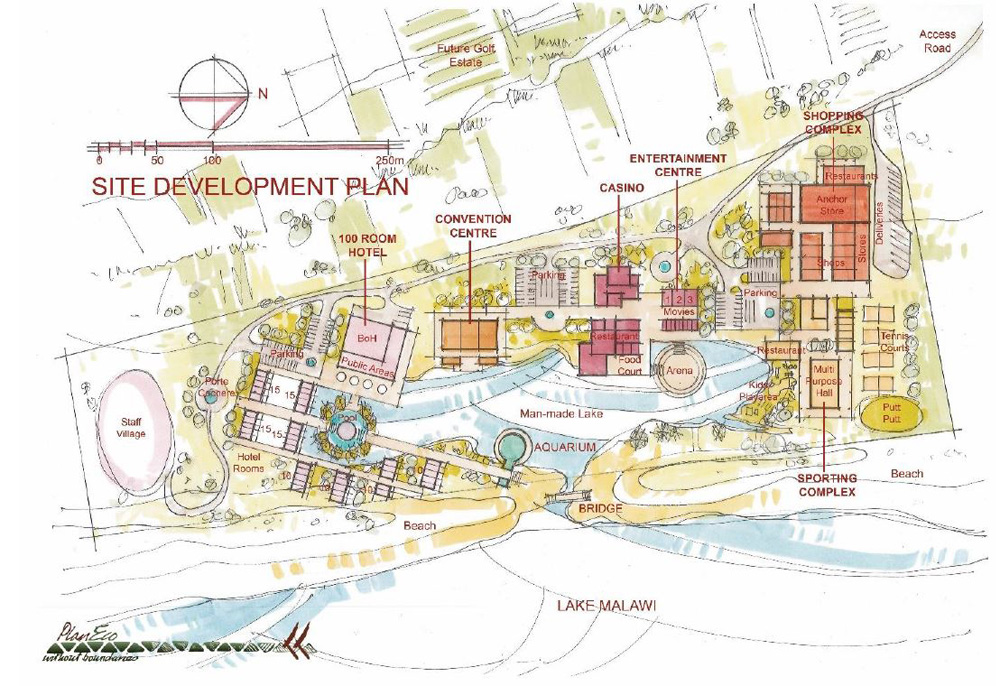
At a glance
The project site is situated on the lakeshore in the Central Malawi region in the Salima-Dowa-Kirk Range – Lilongwe node. The Integrated Resort at Salima will include the following:
- 100-room Resort Hotel
- A partitioned 1,000-capacity Conference Centre
- Sporting complex
- Shopping complex
- Entertainment Centre and Casino
- A golf course with a residential estate,
- An Aquarium.
The details
The Integrated Tourism Resorts will comprise hotels, casinos (which is the drawcard for the development), convention centres, shopping- and sports complexes entertainment centres etc. The proposed project entails the construction of a 100-room Resort Hotel, a partitioned 1,000-capacity Conference Centre, a Sporting complex, a shopping complex, a Casino and Entertainment Centre, a golf course with a residential estate, and an Aquarium.
The lake beaches are public land and open to all, and no development is allowed within the first 30m from the high-water mark. To accommodate the public users of the beach and for other recreation activities, the design concept calls for the construction of a multi-purpose swimming pool joined to the lake, around which the development will take place.
Tourist attractions in the area
Salima is the lakeshore District close to Lilongwe situated about 120 km to the east by road and is already established as a popular weekend retreat and conference venue for residents of the capital. It is a booming tourist location with the potential of becoming a lakeshore city as it is also the primary destination area of the node for MICE, culture and nature niche markets. Currently, all quality tourism activities within the Salima sub-destination address primarily upscale facilities, hence, the need for facilities and activities that address a diverse activity potential including the day visitors and non-guests.
Priority Project 6: Tourism Resort and Houseboats Harbour in Nkhotakota
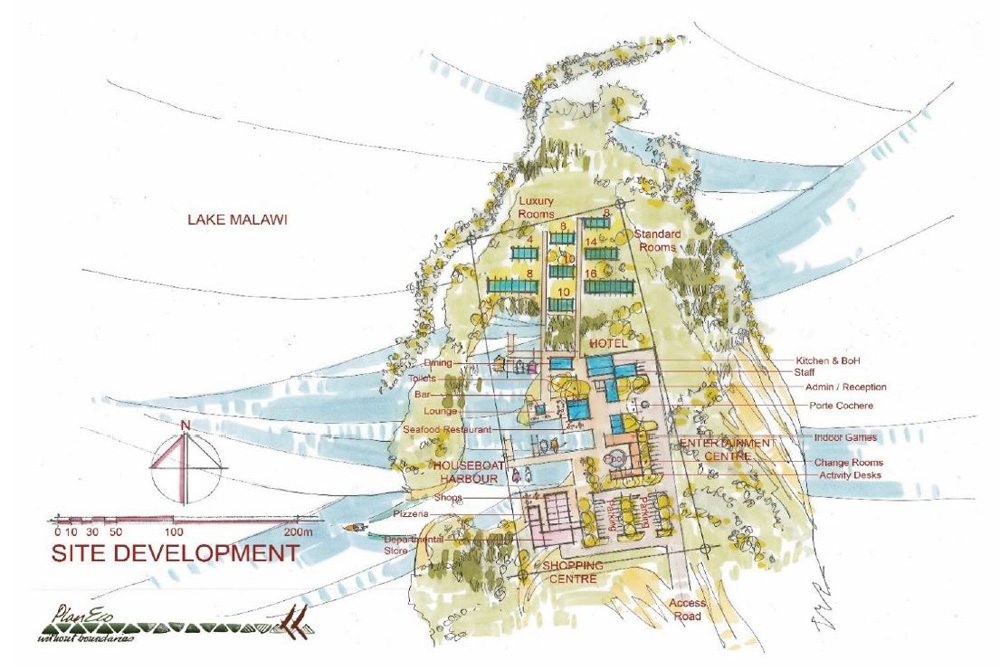
At a glance
The project is in Nkhotakota which lies on the shores of Lake Malawi. This product will consist of a 78-room Hotel, Shopping and Entertainment Centre, a marina and a harbour which can accommodate and service houseboats.
- Hotel will provide standard and luxury rooms
- Entertainment Centre, an indoor games area, swimming pools, activity desks and, refreshment centre
- Shopping Centre with a franchised departmental store, liquor store and shops
- Marina will be able to accommodate 6 houseboats at anchor
The details
The objective is to develop a mid to high-end tourism product that caters for the growing health-conscious market segment thereby diversifying and enhancing the existing tourism product offering in Nkhotakota.
This product will consist of a 78-room Hotel, a Shopping- and Entertainment Centre, a marina and a harbour which can accommodate and service houseboats.
The Hotel will provide standard and luxury rooms, catering to both the domestic as well as international markets. A variety of dining experiences will be offered – a dining room reserved for hotel guests, a seafood restaurant easily accessible to hotel guests as well as day visitors, and a pizzeria. All public areas will overlook the marina and houseboat harbour.
An Entertainment Centre, also open to excursionists will be part of the facility and will have an indoor games area, swimming pools, activity desks and a refreshment centre. Nearby, a Shopping Centre with a franchised departmental store, liquor store and shops will cater to the needs of Nkhotakota residents and visitors. This is where the pizzeria and a food court with fast food outlets will be located. Sufficient secure and shaded parking will be provided. The Marina will be able to accommodate 6 houseboats at anchor.
Tourist attractions in the area
As a tourist destination, the node offers a unique tourism asset inventory that combines the lakeshore with a game reserve, a national park, and a historical attraction. It also boasts a few unique features such as a rainforest and hot springs. Therefore, it offers a regionally unique blend of beach, nature, wildlife, and culture tourism, catering to four of the five tourism focus areas of the government.
Priority Project 7: Lilongwe Riverwalk
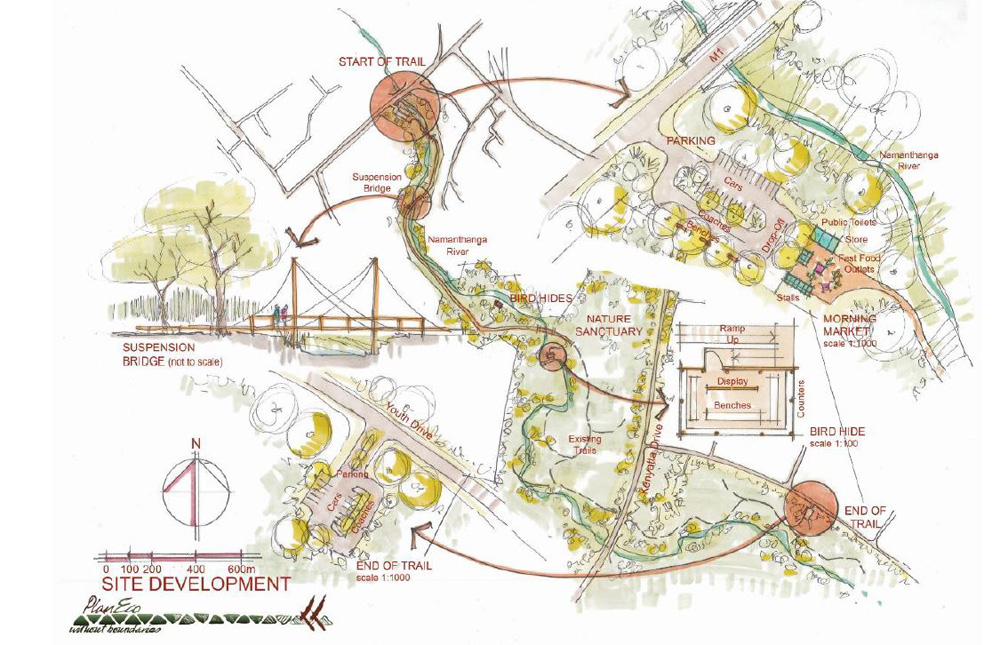
At a glance
The project is located in the heart of the capital city of Lilongwe, which is in the Central part of Malawi. The proposed Riverwalk will support this market, not only for visitors but also for Lilongwe residents.
- Timber Boardwalk which will take visitors from a parking area on the M1 to the Nature Sanctuary
- Fast-food outlet serving sit-down or takeaway meals
- Public Toilets
- Morning Market
The details
The main objective of the proposed tourism project to provide city dwellers with an escape into nature, in the heart of Lilongwe that will enhance tourists’ experience staying in hotels by offering them a wellness activity away from the hotel. The specific objectives of this project include the following:
- Support the MICE market in Lilongwe
- Boost visitor numbers to the Lilongwe Nature Sanctuary
Lilongwe is the gateway for most visitors to Malawi. It also hosts most government departments and many hotels- and conference venues. On average, the length of visitors to the Capital City is minimal due to the lack of activities and facilities supporting the MICE tourism sector – people need interesting things to do to lengthen their stay.
The proposed River Boardwalk project will support this market, not only for visitors but also for Lilongwe residents. A timber boardwalk, 1,7km in length, will take visitors from a parking area on the M1 through the Nature Sanctuary.
The Lilongwe City Council strategic plan for Lilongwe/Lingadzi Ecological Corridor System was developed in 2020 to guide development along these rivers and green the inner city of Lilongwe. The ecological corridor will connect the Botanical Gardens and Nature Sanctuary by connecting green areas adjoining both rivers. The proposed riverwalk fits in with this strategic plan and will make it possible for people to experience the green belt safely and enjoy nature in the middle of the city since visitors will be able to walk the full length of this part of the river on an elevated timber boardwalk, past bird hides and places of rest, and then enter the Sanctuary and continue walking on the existing trails within the sanctuary.
The boardwalk meanders down the Lingadzi River past two bird hides. Benches along the way will allow visitors to rest, relax, and enjoy nature. The boardwalk joins up to existing trails within both parts of the Nature Sanctuary and ends at a parking area on the eastern side of the Sanctuary, off Youth Drive.
Tourist attractions in the area
Lilongwe city is divided into two sections – Old Town and New Town. The old town has much in common with other 20th-century urban developments around the world. Its gleaming modern shops within the city are complemented by the busy streets and walled markets of Old Town, open-air markets, and numerous small shops and other businesses. For those looking for souvenirs, this is the best place to buy one. New Town (also known as the city centre) came into existence after Lilongwe became the capital and has modern buildings, including the national legislative building, government ministries, embassies, hotels, banks, and office towers. The city centre also has Nature Sanctuaries, one that cares for rescued and injured wild animals (Lilongwe Wildlife Centre) and another one that accommodates free-range wild animals.
Priority Project 8: Integrated Resort at Golden Sands at Cape Maclear in Mangochi
At a glance
The project sites are to the south and northwest of Otter Point at Cape Maclear, in the Lake Malawi National Park. This area is also known as Golden Sands. The Integrated Resort at Golden Sands will include the following:
- A 20-luxury room hotel overlooking the Cape Maclear Bay
- A 10-bed eco-lodge at Mfula Bay
The details
The objective of this project is to maximize the development potential of Lake Malawi National Park whilst enhancing the tourism offering at Cape Maclear.
The area known as Golden Sands is the focus of all the lake activities and is named after the old hotel called the Golden Sands Holiday Retreat. There are two (2) sites in Lake Malawi National Park where an integrated resort will be developed which are located to the south and north-west of Otters Point.
The integrated Tourism Resort will comprise a 100-room facility (90-room hotel and 10 independent chalets) and a 10-room eco-lodge as follows:
- 90 room hotel on the Old Golden Sands Holiday Resort site will be constructed of non-masonry materials except where the foundations of the old hotel are used. The hotel will have conference facilities
- 10 Chalets on the top of the mountain and shall overlook the lake
- 20-bed Eco Lodge, to be accessed only by boat or walking trail, located in Mfula Bay, south of Otter Point. The eco-lodge is to be constructed entirely of non-masonry materials.
- The site of Livingstonia Mission and graves will be retained in their present natural state, with the graves themselves and pathways maintained in good condition.
- The Education Centre and aquarium will be renovated and upgraded, as envisaged under the project heading: Aquarium/Environmental Education Centre.
- A Conference facility at the Education Centre will be constructed to cater for Meetings and conventions.
- As an added MICE offering, to cater to the nearby business visitors at the Aquarium and Educational Centre, guided excursions to Chembe Village can be introduced. These offerings will also support local enterprises. Local Tour guides will offer boat trips to other sites of interest.
Tourist Attractions in the area
This node is situated in the Southern region, along the shores of Lake Malawi. As a tourist destination, this node comprises Monkey Bay, Cape Maclear, Lake Malawi National Park and Mangochi. It, therefore, offers a unique blend of lake, culture, nature, and wildlife tourism.
Priority Project 9: Integrated Cable Resort at Mount Mulanje
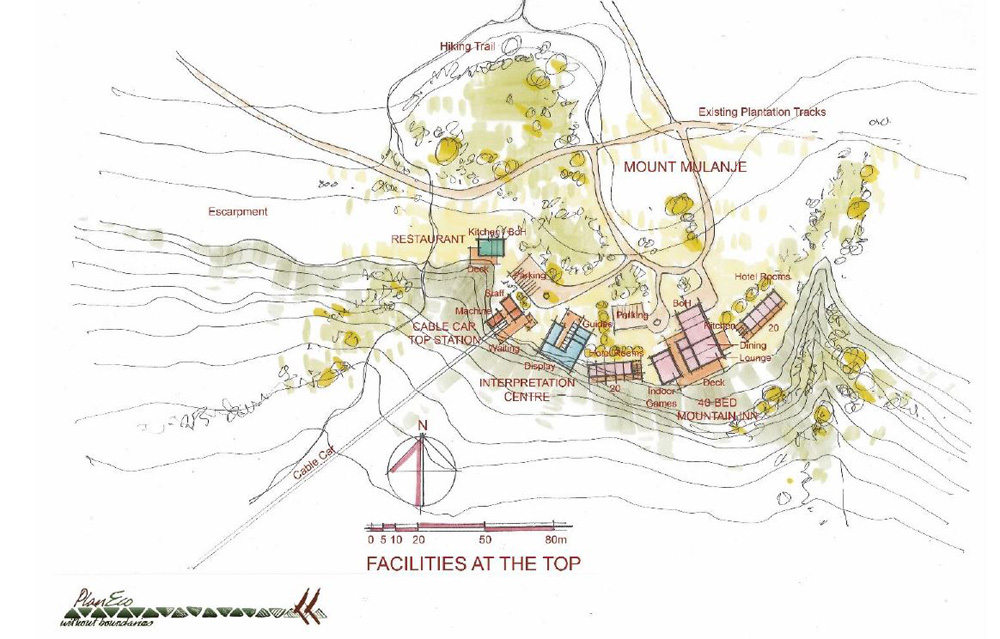
At a glance
Mulanje Mountain is about 94km from Blantyre. The project site is split into two positions, the first being on the low-level area at the old cable car station on the outskirts of Likhubula Village town and the second on the high-lying area in the area of the rock. The following products will be developed at Mount Mulanje:
On the top of the mountain:
- A cafeteria/restaurant seating 60 people
- An Interpretation Centre with a display area, storage, public toilets, administration, and reception
- A 40-60 bed Mountain Inn
At the bottom of the mountain:
- A cable car and an information centre
- Health Spa & Wellness Centre
- A 16 room Eco-lodge
The details
The Integrated Cable Car Resort (ICCR) will consist of a Health and Wellness Centre, restaurant, and activity desks at the base station. A 16-room eco-lodge will be provided close by, while a 30-room Mountain Inn is proposed at the top station. The access to this development will be on the eastern slopes of the mountain, past Likhubula Forest station.
There will be secure shaded parking for 20 cars and 4 coaches at the Likhubula Forest Station. Parking for overnight visitors to the Mountain Inn and a drop-off point will also be provided at the Base Station.
The following tourism products are envisaged at the bottom of the mountain:
- Cable car that will take visitors to a suitable spot on top of Mulanje Mountain. Cable car installations are done by specialist companies who will determine the feasibility and design of the installation.
- An Information Centre, hinting at the wonders of Mulanje Mountain’s geology and history, of which the full story will be told in the interpretation centre on top of the mountain.
- Health Spa & Wellness Centre, containing 4 treatment rooms, an indoor swimming pool, a gym, administration offices and reception, as well as change rooms and toilets.
- Themed Restaurant/s.
- A nearby 16-roomed Eco-lodge (32-bed facility) is proposed within walking distance of the base station and other amenities.
On top of the mountain, the following products could be developed:
- A cafeteria/restaurant seating 60 people. The restaurant will offer a picturesque view from outside decks and offer cosy indoor dining.
- An Interpretation Centre with a display area, storage, workshop area, public toilets, administration, and reception. Curio and craft stalls could be part of or close to the museum. Activity desks and local guides will also be accommodated here.
- A 30-room Mountain Inn (approx.40-60 beds), with fireplaces in each room, offering guests a high-altitude holiday. Visitors will all gain access via cable car, while local transport can take guests to other destinations on top of the mountain. Entertainment and sports activities need to be provided. A phased development starting with 20 rooms is recommended.
Tourist Attractions in the area
As a tourist destination, the node is home to several tourism assets including the Tea estates of Thyolo, the historic and cultural heritage of Blantyre and Chiradzulu, and the Mulanje Massif commonly known as the ‘Island in the sky’.
Priority Project 10: Shire River Waterfront in Liwonde
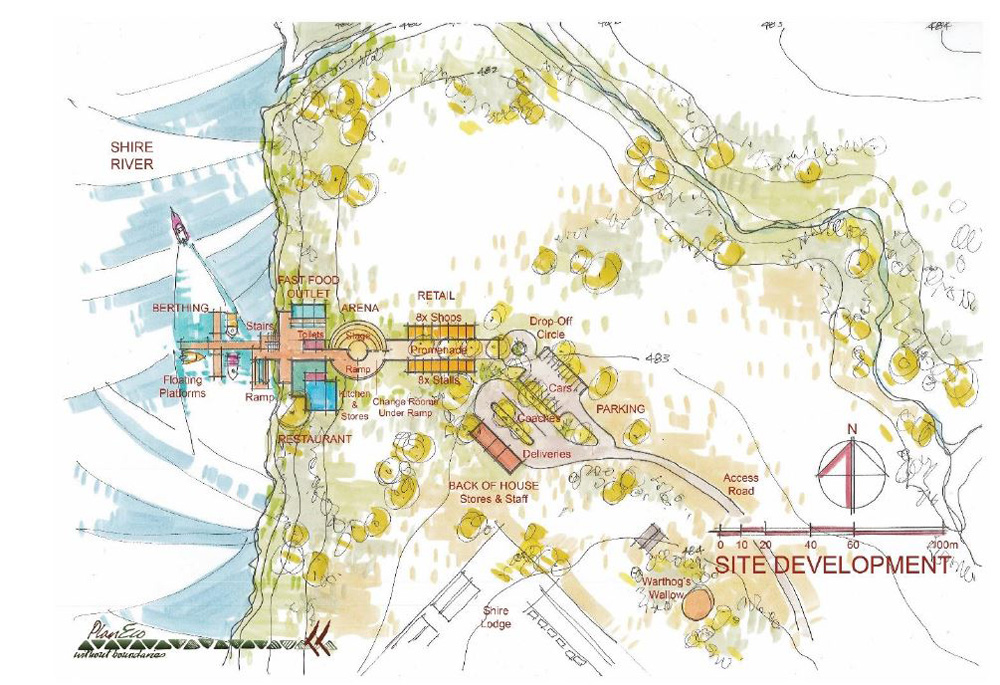
At a glance
The project is in Liwonde town, the Shire River is the only outlet of Lake Malawi and runs through the town to join with the Zambezi River through the lower shire. The project comprises a combination of leisure, retail, dining, and water-based activities. It will include the following:
- Shaded parking for 20 cars and 4 coaches
- Back-of-House building will handle deliveries to the site, and provide staff with facilities
- Shops and stalls selling local crafts, curios, collector’s items
- Wooden Decking which connects a 100-seater restaurant, public toilets, fast food outlets and an arena which can seat up to 100 people
The details
The objective is to develop a world-class Waterfront along the Shire River that will enhance the tourism offering in the Node. The Shire River is an integral part of a water experience and the existing water activities inspire an integrated facility along the river that will expand the tourist experience.
The project comprises a combination of leisure, retail, dining, and water-based activities.
Being located centrally in town, with secure and shaded parking for 20 cars and 4 coaches, this facility will become the place to meet in Liwonde. A Back-of-House building will handle deliveries to the site, provide staff with facilities and accommodate the maintenance team.
Visitors will walk past several shops and stalls selling local crafts, curios, collector’s items, and fresh produce. This paved promenade then turns into wooden decking which ramps down to the main deck 1,5m lower. This deck connects the 100-seater restaurant, public toilets, fast food outlets and arena, and provides access to the floating platforms on the river another meter or so lower than the deck. The arena can seat up to 100 people and will stage live music, dancing and local productions depicting Malawian culture and folklore. Change rooms will be provided underneath the ramp, close to the circular stage in the middle of the arena. Parts of the development site are prone to flooding, so all facilities except the Back of House areas, parking and retail components will be lifted off the ground and built on stilts.
The access road to this will also be utilized for deliveries to the restaurant, fast-food outlets and retail, with additional storage spaces for all provided at the delivery yard. A maintenance store and -workshop will also be located here, on the high-lying ground.
Floating platforms hinged to accommodate the changing levels of the water, will provide berthing for a variety of game viewing- and adventure craft.
Tourist Attractions in the area
As a tourist destination, Liwonde is home to several tourist assets including the historical architecture of the old Capital city and Zomba plateau in Zomba, Liwonde National Park and Milape Pillars in Machinga.
Other Projects in the Malawi Tourism Development Master Plan
Lake facilities and activities
Luxury Lodges on islands in Nkhata Bay, Likoma and Mangochi: Upmarket facilities which offer personal service and exclusivity. The islands will provide activities or take visitors to other destinations on the islands.
Mid-market resorts on the Islands in Nkhata Bay, Likoma and Mangochi: Affordable accommodation on the islands aimed at families and young travellers. The resorts will offer activities, pools, family bars and water sporting activities.
Public beach facilities in Senga Bay, Salima and in Monkey Bay, Mangochi: Ablutions, change rooms, open-air stalls and fast-food outlets for day visitors at public swimming beaches.
Houseboats in Chia Lagoon, Nkhotakota and Mangochi: Houseboats on Lake Malawi that provide opportunities for fishing and birding excursions.
Mid-market resort at Denbo River estuary, Chiweta: Resort with private beach and sports facilities around the river.
Lodging and Conferencing facilities
Ecolodge in Usisya, Misuku Hills and in the Thuma Forest Reserve: Small ecolodges that allow interaction with local people.
New Conference Lodge at Thazima, Nyika Nationa Park and on Lake Malombe, Mangochi: Upmarket and mid-market lodge and conference centre respectively offering delegates and spouses an opportunity to break from city life.
New Game Lodges in Kasungu National Park (near Kangwa) and in Liwonde National Park: Traditional “game lodge” products consisting of free-standing chalets linked to the central dining and entertainment area.
Upgrading of the Hiking Huts on Mount Mulanje: Upgrade huts and provide additional amenities to meet the expected growth in visitor numbers and today’s market needs.
Camping and excursions
Plantation Excursions in Vizara, Kavuzi, Limpasa and Thyolo: Packaging daily excursions into tea, sugar, and rubber tree plantations. Existing plantation houses can be used for restaurants and lounges, while others might be converted to self-catering overnight accommodation.
Overlander campsites on the outskirts of Mzuzu, on the North Rukuru river, in north-western Karonga and various locations in Salima: Facilities to put up tents and space to park and manoeuvre a 10-ton truck. Covered facilities to prepare meals and dine, and ablutions.
Basecamp for hikers and mountain bikers in the Ntchisi Forest Reserve and Nkhoma Mountain Tourism Centre & Trails: Provide an affordable facility where hikers and bikers start their outings to surrounding areas offering natural beauty and cultural interests.
Nature walks in Chilundu Point, Nkhata Bay and hiking trails into the Fort Lister area of Mulanje Mountain: Base camps providing small cafeterias, public ablutions, and other facilities.
Cultural projects
Purpose-Built Archival Building, Village Museum, and Antiquities Research and Art Centre in Lilongwe: The infrastructure will play a major role in the preservation of the cultural, natural, and documentary heritage of Malawi. It will enhance research, preservation, presentation, and promotion of Malawi’s heritage through displays, performances, exhibitions, and the provision of proper storage and retrieval conditions. It will also enhance and promote cultural tourism, while encouraging creativity by providing the means of producing and marketing authentic Malawian cultural material, in line with the Buy Malawi Strategy.
Upgrade the Karonga Cultural and Museum Centre: Enhancing the Malawisaurus dinosaur displays (even adding intuitive audio-visual material) and cultural activities, which could be accommodated in more traditional Malawian facilities on the same premises.
Slave Trade Museum in Mwahimba Village, Karonga and Fort Mangochi Museum, near Mangochi: Renovate an old building in the Mwahimba village as a museum to tell stories of the horrors of the slave trade. Create a themed Visitors Centre in Mangochi, including the old Fort, built in 1895, and recreate old slave routes in the area.
Development of the Dr Livingstone Information Centre as part of the Malawi Slave Trade Heritage Route in Nkhotakota: Development of an Information Centre containing a museum and library supported by public amenities. The Centre will tell Dr David Livingstone’s story as well as that of the Slave Trade, which he was instrumental in dismantling.
Outdoor activities
Visitor Information Centres and Entrance Gates at Vwaza Marsh Wildlife Reserve, Dzalanyama Forest Reserve, Lake Malawi National Park, Chongoni Rock Art Site, Lake Kaulime and Mulunguzi Dam: Well-designed and equipped Entrance Gate and Visitors Centre. The facilities would have a reception area where entrance fees are paid and information handed to visitors including public toilets.
Recreation Park, Mzuzu: A Recreation Park, which also serves as a Tourism Information Centre, offering various indoor- and outdoor activities, a choice of eateries, childcare facilities and activity desks selling destinations in the Northern Region.
Shire River Waterfront Development in Zalewa: A Waterfront Development on the river with water activities, birding and fishing trips upstream and white-water rafting or canoeing downstream. Decks with floating platforms will connect the river to the facilities comprising retail and refreshment amenities.
Catering opportunities
New Mountain Inn & Campsite, Cafeteria and Viewpoint in the Dzalanyama Rain Forest: A mid-market Mountain Inn, located in the Mchinji part of the Forest Reserve. A campsite with 20 stands and shared ablution facilities will be part of the development. A small cafeteria to provide snacks and light meals to people seated in a 30-seat dining area overlooking the forest.
Traditional Seafood Restaurant in Chembe Village: A 50-seat+ rustic restaurant on Chembe beach. Guests can be taken on short fishing trips to show them where the food comes from.
Medical project
New Medical Retreat in Zomba: A 100-bed medical retreat for patients needing fresh air, quietness and healthy exercise with indoor activities, and excursions into Zomba city.
The content (including images) of this Malawi Tourism Development Master Plan article has been extracted from 1. The Pre-feasibility Analysis for 10 Priority Tourism Projects in Malawi, and 2. Investor Pitch Presentation. Both documents were complied by Avasant and sourced from the Ministry of Tourism.

